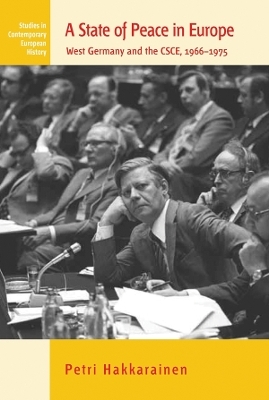
A State of Peace in Europe
Berghahn Books (Verlag)
978-1-80073-731-0 (ISBN)
Petri Hakkarainen is the Political Director at the Finnish Ministry for Foreign Affairs. Prior to that, he worked for over five years as the Director of Foreign and Security Policy at the Office of the President of Finland. During his career at the Finnish Ministry for Foreign Affairs since 2006 he has been stationed in Washington, Berlin and Helsinki, as well as at the Geneva Centre for Security Policy (GCSP) and at the Institute for Advanced Sustainability Studies (IASS) in Potsdam. He received his doctorate in Modern History from the University of Oxford in 2008. In 2009 his dissertation was awarded the Willy Brandt Prize for the 'advancement of outstanding young scholars' by the Chancellor Willy Brandt Foundation.
List of Abbreviations
Acknowledgements
Chapter 1. Introduction: Era of Negotiations
European Détente
The CSCE
German Foreign Policy
On Structure and Sources
Chapter 2. 1966-69: Incubation of Strategies
The Early Years and the Eastern ‘Propaganda Circus’
The Budapest Appeal: ‘We Could Have Drafted it Ourselves’
Consultations Abroad, Electioneering at Home
Nobody Expects the Finnish Initiative
Promises of East-West Cooperation or an Instrument of Deutschlandpolitik?
Chancellery versus Auswärtiges Amt
Emphasis on Linkage: Bahr’s Foreign Policy Plans on the Eve of the Election
Bonn and the Security Conference during the Interregnum
Conclusion
Chapter 3. 1969-70: Bilateral Leverages and European Security
Western Support for the Linkage with Deutschlandpolitik
Horse-Trading in Moscow
Rethinking the Linkage Strategy
Berlin Surpasses Other Preconditions
Discovering the Potential of the CSCE
Conference on Security or Conference on Cooperation?
Conclusion
Chapter 4. 1970-71: Transition to Western Multilateralism
Following the French Lead on Berlin Linkage
Defending the Berlin Precondition in Lisbon
Divergent Interpretations of the ‘Successful Conclusion’
Nothing Quiet on the Western Front
Broadening the German Horizon in the NATO Framework
From America’s Advocate to the Main Proponent of EPC
Conclusion
Chapter 5. 1971-72: Towards a European Peace Order?
The Decline of the Linkage between the CSCE and Deutschlandpolitik
Hesitating on the Berlin Precondition
Blackmailing the Finns?
An Inner-German Shotgun Wedding
Europeanisation of Ostpolitik
In Defence of the Eastern Treaties and Bonn’s Sovereignty
A New Flow of German Activity
Peaceful Change, Self-Determination of Peoples and Military Security
Freer Movement: Change through Rapprochement?
Berlin as a CSCE Location?
Avoiding Bilateralism
Conclusion
Chapter 6. 1972-75: Deutschlandpolitik at the Conference
Alphabet Diplomacy in Dipoli
Peaceful Change, Act 1: Defending the Moscow Treaty
Peaceful Change, Act 2: Enter Genscher
Peaceful Change, Act 3: Commas for the National Interest
Basket III: Human Contacts
Follow-up and Berlin
Conclusion
Chapter 7. Conclusion: Evolution instead of Revolution
Sources and Bibliography
Index
| Erscheinungsdatum | 18.11.2022 |
|---|---|
| Reihe/Serie | Studies in Contemporary European History |
| Verlagsort | Oxford |
| Sprache | englisch |
| Themenwelt | Geschichte ► Allgemeine Geschichte ► Neuzeit (bis 1918) |
| Geisteswissenschaften ► Geschichte ► Regional- / Ländergeschichte | |
| Sozialwissenschaften ► Politik / Verwaltung ► Europäische / Internationale Politik | |
| ISBN-10 | 1-80073-731-9 / 1800737319 |
| ISBN-13 | 978-1-80073-731-0 / 9781800737310 |
| Zustand | Neuware |
| Haben Sie eine Frage zum Produkt? |
aus dem Bereich


